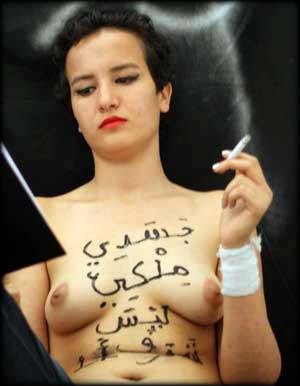
Read an introduction to the series here
What the law says
Article 226 of the Tunisian Penal Code: “Anyone who is knowingly guilty of insulting public decency is punishable by six months imprisonment and forty-eight dinars”
Article 121 of the Tunisian Penal Code: “The distributing, offering for sale, publicly displaying, or possessing... tracts, bulletins, and fliers...that are liable to cause harm to the public order or public morals. Punishable by immediate seizure of the offending material and imprisonment for six months to five years, and a fine of 120 to 1,200 dinars”
How the law is used
The absence of blasphemy laws does not mean that the rights of people to express themselves without fear of religiously motivated persecution are protected. The recent publicity around the Tunisian feminist activist, known as Amina, is one example of this.
Amina, 19, uploaded topless pictures of herself on a website she created for the feminist movement Femen, with women’s rights slogans, such as "my body belongs to me and is not a source of somebody's honour", painted on her body. Her actions were immediately condemned by conservative groups in the country. A prominent Salafi leader called for her to be sentenced according to Sharia (80 to 100 lashes), or, because of the “severity of her crime”, to be stoned to death. He said this should be done because her acts may “bring about an epidemic" (presumably of other women demanding rights). Amina has subsequently disappeared. There are several accounts of her whereabouts, but none have been confirmed. The Tunisian Femen website has also been hacked, and the pictures replaced by verses from the Qur’an.
The revolution of 2011 put a stop on the decades-long state-enforced secularism and restrictions on religious observance in Tunisia. The government has since been dominated by Ennahda, a moderate Islamist party. While nominally supportive of freedom of speech and expression, threats and assaults on journalists critical of the party are commonplace. Indeed, observers in Tunisia are describing rising Islamic conservatism. Also, violent attacks conducted by extremist Salafi groups against anything regarded un-Islamic are becoming increasingly common.
Amina has mainly been threatened by conservative believers. However, the law of Tunisia ought to be on her side. The country has no laws against offending the religious feelings of Islamists. On the contrary, issuing death threats should be considered a more serious offence, whether or not coming from a religious authority. However, the sad truth is that Amina, if charged, will face a system that favours the zealous. In the recent past, there have been several convictions for crimes against public decency or morals. For example, in March 2012, two writers were given seven year prison sentences for publishing materials deemed "liable to cause harm to public order or public morals". These materials were satirical online writings on Islam and the Prophet. Amina would most likely face charges for offending public decency, and consequently a sentence of a fine of 1 000 dinars (£415) and six months imprisonment.
However much Amina’s nudity and support of women’s rights upset the feelings of decency and moral of Tunisia’s Islamists, she did nothing to justify either death threats or legal charges. The threats issued by extremist Salafi leaders may be that of a small minority, but the government’s inability, or unwillingness, to control and properly punish these groups does not point to positive future developments for freedom of expression in Tunisia. Also, the Islamist understanding of women’s place in society is not that of the common Tunisian citizen, as became clear previously when Ennahda was forced to change the wording of the new constitution describing gender relations to “equality” instead of “complementarity”. Even more tellingly, the party was pressured to drop its agenda of criminalising blasphemy. However, even if the citizens do not wish to prosecute people for blasphemy, Tunisia’s secular laws are already being used to the advantage of easily offended Islamists and those who benefit from restraining free speech.
What you can do
Amina’s case has drawn a lot of attention in Tunisia and abroad. April 4th was named as the International Day to Defend Amina (or the Topless Jihad Day), with women appearing bare-breasted outside mosques and Tunisian embassies to show their support. However, Amina recently appeared on a French TV channel condemning the topless demonstrations. She says that she still supports Femen, but that the demonstrations were too much of an insult to Muslims. The topless jihad also sparked a Facebook group “Muslim Women against Femen”, with Muslim women appearing in Hijabs bearing slogans such as “Islam gave me freedom”.
A petition calling on the Tunisian government to protect Amina’s rights to express herself without fear has gained more than 100,00 signatures – you can add yours at Change.org.

